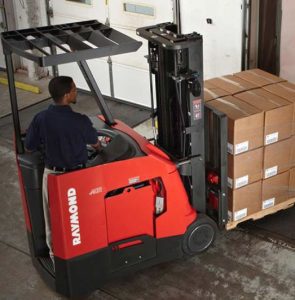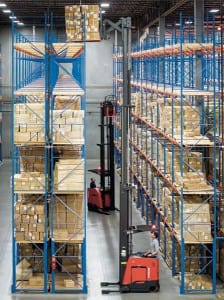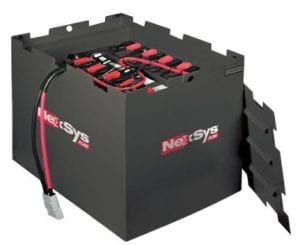Often, when companies are in the market for a new forklift, the choices available can seem overwhelming. What brand should I consider? What truck type best suits our needs? Will the right forklift fit our budget? There are always many questions to consider but answering a few KEY questions can help make your decision easier.
Here are four important questions to help you prepare for your forklift search.

- Load type to be handled? – Are your loads palletized and if so, what sizes are being handled? Forklift capacities are based on half of the load depth, typically 24 inches for standard 48-inch pallets and up to 48 inches for deep loads. Longer load depths will de-rate the capacity of lift trucks so consult with a material handling expert who will ensure you choose the right capacity truck.
- How much capacity do we need? – Once you have identified the maximum capacity of your loads being handled, the next thing is to determine how high these loads need to be lifted. Are you bulk stacking on the floor? Are loads being stored on pallets racks? Or are you just moving loads at floor level? Forklift capacities downrate the higher you lift the load, especially when lifting over 15 feet. As an example, if your need is to store 3,000 lbs. loads on a rack beam level at 20 feet high, depending on the style truck you choose, you might need a 4,000 lbs. base capacity truck, or greater, to safely do this.
- Indoor use, outdoor use, or both? – This is obviously a simple question, but its answer has a BIG effect on the
 type of truck you should consider and the options you may want to include. If used strictly outdoors, you will likely be looking at sit down counterbalanced forklifts that are propane or diesel fuel powered. Common outdoor truck options include treaded cushion or pneumatic tires and an operator cab enclosure. Indoor truck use will likely steer you to an electric forklift with many types to choose from, including 3-wheel and 4-wheel counterbalanced trucks for loading/unloading trailers on your docks or handling bulk loads in staging areas, and narrow aisle reach and deep reach trucks for stacking palletized loads in rack systems. If your goal is to maximize storage capacity and you have a tall building, a very narrow aisle wire guided swing reach turret truck may be the appropriate choice.
type of truck you should consider and the options you may want to include. If used strictly outdoors, you will likely be looking at sit down counterbalanced forklifts that are propane or diesel fuel powered. Common outdoor truck options include treaded cushion or pneumatic tires and an operator cab enclosure. Indoor truck use will likely steer you to an electric forklift with many types to choose from, including 3-wheel and 4-wheel counterbalanced trucks for loading/unloading trailers on your docks or handling bulk loads in staging areas, and narrow aisle reach and deep reach trucks for stacking palletized loads in rack systems. If your goal is to maximize storage capacity and you have a tall building, a very narrow aisle wire guided swing reach turret truck may be the appropriate choice.
- Usage? – How many days per week and how many hours per day will the truck need to operate? If your operation is light (5-days/week, about 2-4
 hours/day) a used truck is an option. If you’re operating less than 2-shifts for about 8-hours/day, a 24-volt truck will likely be sufficient. Multiple shift operations should consider 36- or 48-volt trucks for better productivity and longer run times. Another consideration for electric trucks is power. Lead acid industrial batteries are still the norm, however, there are several alternatives to consider such as Thin Plate Pure Lead (TPPL) batteries that offer maintenance-free power and faster recharging. Lithium-Ion batteries are becoming more and more popular, especially for multiple shift operations as they last for seven years or more and don’t require changing batteries to keep the truck in operation.
hours/day) a used truck is an option. If you’re operating less than 2-shifts for about 8-hours/day, a 24-volt truck will likely be sufficient. Multiple shift operations should consider 36- or 48-volt trucks for better productivity and longer run times. Another consideration for electric trucks is power. Lead acid industrial batteries are still the norm, however, there are several alternatives to consider such as Thin Plate Pure Lead (TPPL) batteries that offer maintenance-free power and faster recharging. Lithium-Ion batteries are becoming more and more popular, especially for multiple shift operations as they last for seven years or more and don’t require changing batteries to keep the truck in operation.
Advantages of working local
Buying a forklift is a big decision. That’s why working with an experienced, trusted material handling partner like Abel Womack is key. Our local experts visit your facility and guide you through the questions and details necessary to ensure you get the best trucks for your operation and achieve your goals.
Looking for trusted advice, professional service, and a full suite of forklifts and equipment in your neighborhood? Contact Abel Womack today.

 type of truck you should consider and the options you may want to include. If used strictly outdoors, you will likely be looking at sit down
type of truck you should consider and the options you may want to include. If used strictly outdoors, you will likely be looking at sit down  hours/day) a used truck is an option. If you’re operating less than 2-shifts for about 8-hours/day, a 24-volt truck will likely be sufficient. Multiple shift operations should consider 36- or 48-volt trucks for better productivity and longer run times. Another consideration for electric trucks is power. Lead acid industrial batteries are still the norm, however, there are several alternatives to consider such as
hours/day) a used truck is an option. If you’re operating less than 2-shifts for about 8-hours/day, a 24-volt truck will likely be sufficient. Multiple shift operations should consider 36- or 48-volt trucks for better productivity and longer run times. Another consideration for electric trucks is power. Lead acid industrial batteries are still the norm, however, there are several alternatives to consider such as 

Leave a Reply
You must be logged in to post a comment.